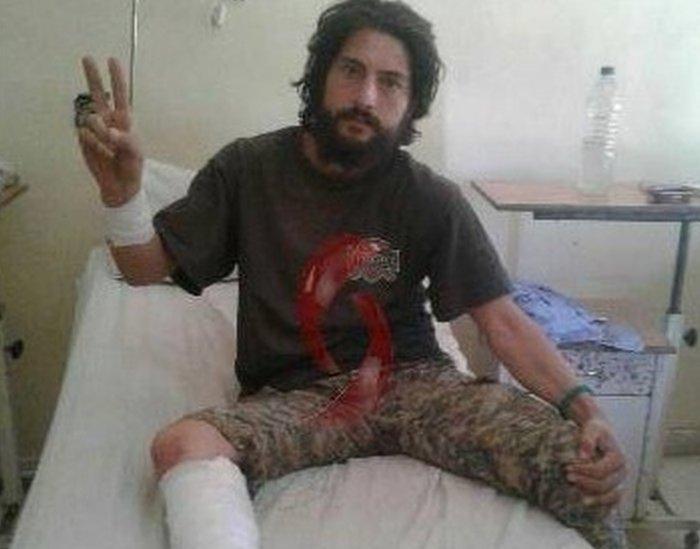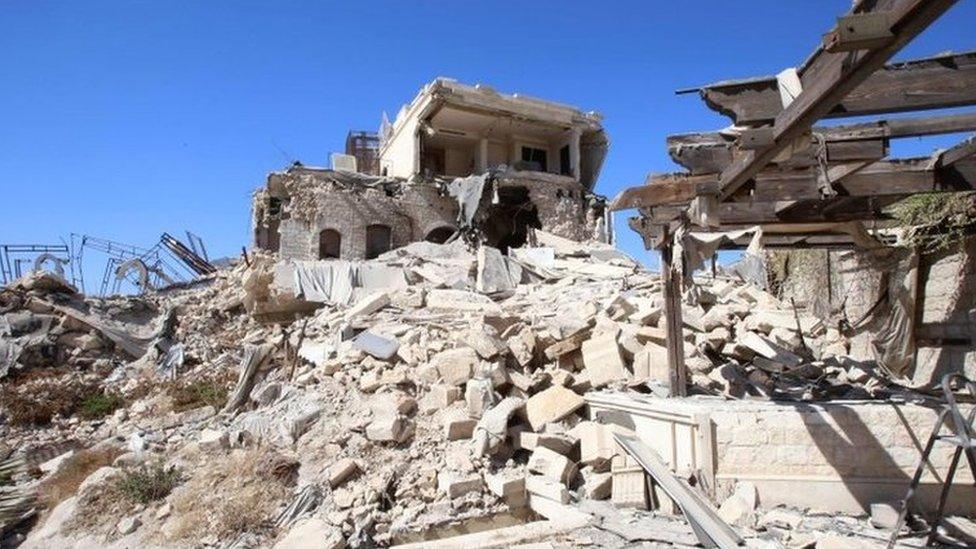Syria conflict: US air attack endangers truce - Russia
- Published

Image from a group close to the Syrian army, purportedly of a soldier wounded in the coalition air strike on a base in Deir al-Zour.
A US-led air attack in eastern Syria that killed dozens of government troops fighting so-called Islamic State has endangered an already shaky ceasefire deal, Russia says.
Russia says at least 62 Syrian troops were killed in the Deir al-Zour strikes on Saturday.
The US has expressed "regret" for the "unintentional loss of life".
Syria says it has lost a warplane in the area, which so-called Islamic State (IS) said it had shot down.
The BBC's Lina Sinjab, reporting from Beirut, says it is rare for the Syrian government to acknowledge losses caused by IS, and the announcement may be intended to draw attention to the consequences of the US-led air strike.
A Syrian army source said the attack had allowed IS to gain ground in the area around the Syrian airbase, but that Syrian forces had regained most positions on the hilltop nearby with the help of Syrian and Russian air support.
The attack put "a very big question mark" over the truce's future, said Russia's UN Ambassador Vitaly Churkin.
A ceasefire deal agreed by the US and Russia went into effect in Syria on Monday, but important terms of the deal, such as the safe passage of aid, have still not been fulfilled.
Monitors on Sunday reported the first air strikes in Aleppo since the truce took effect.
Several people were injured in the air raids, said the UK-based Syrian Observatory for Human Rights, but it could not identify who carried them out.

Russian war planes continued bombing IS positions in the Deir al-Zour area on Sunday
'American heavy-handedness'
The air attack caused a bitter row between the US and Russia at the United Nations Security Council on Saturday night, with each country's representatives walking out while the other was speaking.
US envoy Samantha Power criticised Russia for calling an emergency meeting of the council, which she said was "cynical and hypocritical".
"Russia really needs to stop the cheap points-scoring and the grandstanding and the stunts and focus on what matters, which is implementation of something we negotiated in good faith with them," she told reporters.
But Mr Churkin said he had never seen "such an extraordinary display of American heavy-handedness" as shown by Ms Power.

Vitaly Churkin and Samantha Power sparred at the UN
He implied the future of the Syria deal could rest on how Washington reacts to the incident.
"If what Ambassador Power has done today is any indication of their possible reaction then we are in serious trouble," Mr Churkin said.
The cessation of hostilities brokered jointly by the US and Russia does not include attacks on IS or other jihadist groups.

Analysis by BBC diplomatic correspondent Jonathan Marcus
Washington's mistaken air strikes on Syrian government forces raise several questions; not least why American aircraft were hitting what they thought were IS positions in an area where IS was engaged with Syrian forces.
The US role is clearly not directly to assist Mr Assad's troops against IS fighters.
The strikes, belatedly called off after the Russians notified the Americans, have made a delicate situation even more complex.
They have put at risk a ceasefire that so far, is only partial, and that has not yet provided the promised access for aid deliveries to begin in earnest.
The error - admitted by the Pentagon - is bound to erode what limited trust, if any, exists between Washington and Moscow. If the ceasefire does survive, that is going to make implementing any plans for a coordinated US-Russian air campaign against IS that much harder.

How the Americans explained the attack
US Central Command said the coalition believed it was attacking IS positions and the raids were "halted immediately when coalition officials were informed by Russian officials that it was possible the personnel and vehicles targeted were part of the Syrian military".
It said the "Combined Air Operations Center had earlier informed Russian counterparts of the upcoming strike".
The strike and circumstances surrounding it will be reviewed it said, "to see if any lessons can be learned".
Australian aircraft also took part in the bombing. Its Department of Defence offered its condolences to the families of government soldiers killed or wounded.
Response to the US account
Russia's foreign ministry spokeswoman has been quoted as saying that the attack showed "that the White House is defending Islamic State".
Syria's foreign ministry said it was "planned and deliberate" and suggested "pre-coordination between IS and the US forces".
The Syrian Observatory for Human Rights, a UK-based monitoring group, reported the strikes had killed at least 90 soldiers.

Numerous ceasefire breaches by Syrian government troops and rebel groups have been reported
Only if the current ceasefire - which began on Monday - holds for seven days, will the US and Russia begin co-ordinated action against the Jabhat Fateh al-Sham group, which was previously known as the al-Nusra Front, and IS.
There have been no previous confirmed cases of US air strikes targeting Syrian troops. Last December, Syria accused the coalition of attacking a government army camp in Deir al-Zour but the US denied it.
Russia's military had already expressed fears for the ceasefire. It said rebel groups had increased attacks and it urged the US to act or be responsible for the collapse of the truce.
General Viktor Poznikhir said: "Our repeated messages to the American side are left without a response. There is doubt that the US is able to influence the moderate opposition they control."
Footage appears to show Free Syrian Army rebels chasing US special forces out of the northern Syrian town of Al-Rai
The terms require moderate rebel groups to separate themselves from jihadists.
A US National Security Council spokesman later said the cessation was "broadly holding" despite "challenges on both sides".
The deal was meant to allow the safe passage of aid to besieged areas of Syria, but some 20 trucks have been waiting in Turkey since Monday, unable to travel to rebel-held east Aleppo.

The Syrian truce
A deal was brokered by Russia and the US that began with a nationwide ceasefire from Monday between the armed opposition and the Syrian government, but not jihadist groups
The ceasefire will be renewed every 48 hours if it holds
It is meant to allow for "unimpeded and sustained humanitarian access" to besieged areas, including Aleppo
If the truce holds for a week, Russia and the US will bomb militant groups together, including so-called Islamic State and Jabhat Fateh al-Sham (formerly the Nusra Front)
The "legitimate opposition" are meant to distance themselves from such groups
The deal has faced widespread scepticism, not least because the US backs anti-government rebel groups while Moscow is a key ally of the Syrian government
The deal could pave the way for a political transition, the US says
